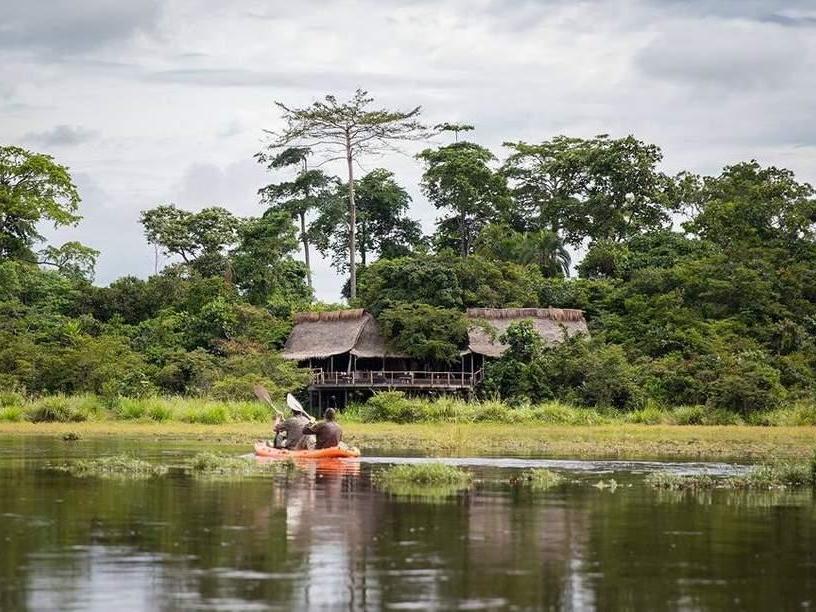"The necessity to preserve the Congo's rare species of wildlife"
Protecting the environment is a top priority for Félix Tshisekedi, leader of the Union for Democracy and Social Progress in The Democratic Republic of Congo

Your support helps us to tell the story
From reproductive rights to climate change to Big Tech, The Independent is on the ground when the story is developing. Whether it's investigating the financials of Elon Musk's pro-Trump PAC or producing our latest documentary, 'The A Word', which shines a light on the American women fighting for reproductive rights, we know how important it is to parse out the facts from the messaging.
At such a critical moment in US history, we need reporters on the ground. Your donation allows us to keep sending journalists to speak to both sides of the story.
The Independent is trusted by Americans across the entire political spectrum. And unlike many other quality news outlets, we choose not to lock Americans out of our reporting and analysis with paywalls. We believe quality journalism should be available to everyone, paid for by those who can afford it.
Your support makes all the difference.By Guety Mpanu-Mpanu
The UK government will host a major international conference on the fight against illegal wildlife trade next week. The Democratic Republic of Congo, a Central African country the size of a sub-continent, will be represented by several delegations, including that led by Félix Tshisekedi.
Tshisekedi is a well-known personality in the political microcosm of the Democratic Republic of Congo, he is the leader of the political party the Union for Democracy and Social Progress [UDPS] and one of the heavyweights of the opposition in the running for the presidential elections scheduled for 23 December.
I interviewed Tshisekedi and here is his standpoint on this very important matter. With an evident passion and enthusiasm for all issues related to the vital sector of the environment, Tshisekedi first gave a quick overview of the Congo’s environmental assets, emphasising that the Democratic Republic of Congo has the largest reserve of fresh water in the planet after the Amazon basin. He highlighted the major role the Congolese forests, an estimated 5% of the world area, plays in preserving the climate, before insisting on the importance of the hundreds of millions of arable land not yet exploited but likely to be utilised in the context of a 21st century agriculture that is organic and meets ecological standards.
With regard to the specific purpose of this conference, the protection of wildlife against illegal trafficking,Tshisekedi stated that his country has more than 409 species of mammals, about a thousand species of birds, and hundreds of species of amphibians and reptiles, unevenly distributed across the country.
He also commented that many species, such as the forest elephant, the buffalo, the lowland gorilla, the giant pangolin, the yellow-backed antelope (duiker), who live in the Mayumbe forest are now endangered due to the degradation of the forest.
Elsewhere, he continued, the preservation of several rare species of wildlife including the Okapi, the Northern White Rhinoceros, the Bonobo, the Congolese Peacock, mountain gorillas, although protected in the many reserves and large national parks, requires that proactive policies be put in place to provide the country with appropriate and even more efficient management structures endowed with human, financial and logistical resources reflecting the high ambitions which, for Tshisekedi, are very tall.
Having identified other causes of endangerment and extinction of wildlife, such as poaching and the imperative necessity for villagers to hunt for food, the UDPS's president argued that a responsible government should address the issue of an effective social promotion of the populations of these regions through the development of agriculture, and the creation of jobs likely to disengage them from these practices that cause so much harm to the environment in general, and to wildlife in particular.
Strengthening the capacity and effectiveness of forest rangers is also one of the major concerns of the political leader, who strongly believes that the massacre of more than a dozen Okapis of the Faunal Reserve of Epulu, a few years ago, could have and should have been avoided.
The presidential candidate concluded that widespread corruption in all sectors of the national, and, more particularly in this sector, must be fought with the utmost energy, through the implementation of awareness-raising and empowerment measures. but also repression by a government that will be accountable from the start of its five-year term.
Join our commenting forum
Join thought-provoking conversations, follow other Independent readers and see their replies
Comments